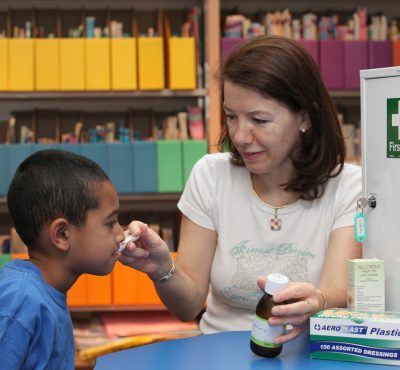The school has a policy on medications. Parents must inform the school office and the classteacher of any medication needs to be administered to a pupil during school time. Written instructions must be given.
All medications must be collected from the school office by the parent/carer.
For the school to administer a medication to a pupil, the medication must have the pupils’ name and be prescribed by a doctor.
If a pupils has asthma, a pump clearly labelled with their name and class must be left with the office administrator in the school office.
Pupils who have serious medical conditions are subject to a care-plan which is drawn up by the school nurse. The school nurse reviews the care-plans as required – which is usually annually.
Pupils who suffer from a food or medical allergy must have this confirmed by a medical professional. Parents are expected to provide this information at enrolment or when required.
Reporting of accidents and injury to pupils
All serious accidents and/or injuries are entered in the pupil accident report book by a staff member and reported to parents in writing.
Serious accidents or injury include:
- Badly bumped heads, e.g. heavy bruising, headache, distorted sight
- Possible fractured/broken bones
- Severe cuts or external bleeding
- Twisted ankles
- Asthma attacks (not normal)
Minor accidents are not normally reported to parents and may include the following:
- Grazed knees, elbows, etc.
- Complaints of minor stomach-ache or headache
- Minor injuries to limbs
- Normal nosebleeds
- Other injury assessed to have no major impact on child’s well-being
Accidents/injury to staff or visitors
Any accidents involving staff, visitors or parents must be reported to the school office immediately.



